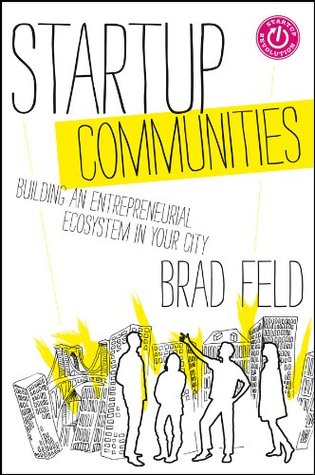More on this book
Community
Kindle Notes & Highlights
by
Brad Feld
Read between
June 27 - July 13, 2014
Vary the event’s date and time.
Schedule daytime events.
Rather than trying to hang on to each new thing he creates, he happily hands them off to others to run with them.
Startup Week continues to be a decentralized, chaotic volunteer event that pulls together the Boulder startup community for one week each year. —Andrew Hyde, @andrewhyde
we set aside 1 percent of our equity for the community.
The Boulder startup community has a long list of additional activities,
TechStars (http://startuprev.com/d6), a mentor-driven accelerator that was founded in 2006 by David Cohen.
mentors rarely knew what they were going to get out of TechStars but they engaged with the belief that it would be worth it.
open sourcing and sharing the TechStars playbook.
David Tisch’s story of how TechStars New York came together.
Global Accelerator Network (http://startuprev.com/f0), an organization for helping independently owned and operated accelerator programs.
ACCELERATORS ARE DIFFERENT THAN INCUBATORS
Although incubators serve a useful purpose, and many have helped startups become successful, it’s important to differentiate between accelerators and incubators.
They heard the calls from Peter Thiel to drop out of college (http://startuprev.com/o2).
when there is a crisis, there is great opportunity for innovation.
what we could do to meet this challenge of making the academic environment more conducive to successful entrepreneurial development.
MIT’s mission is to educate our students and have a positive impact on the real world.
UNIVERSITY INVOLVEMENT
Universities are a useful and important part of a startup community.
there are many additional things a university can do to enhance the startup community.
three core objectives: (1) to support entrepreneurship; (2) to prepare and encourage students at the University of Colorado to take advantage of opportunities in the tech sector; and (3) to raise the level of discourse on technology policy.
Venture Challenge competition and statewide by supporting the Startup Colorado
you are all entrepreneurs now. Whether or not they join a startup or a large company, the reality is that all students should think of themselves as
One core challenge for federal, state, and local technology policy discussions is that the entrepreneurs—and the companies not even born yet—are not represented.
entrepreneurs are often too busy to take the time to get up to speed on the details of spectrum policy, the arcana of patent law, the details of digital copyright discussions, or any other range of policy debates
connect the various entrepreneurial activities across CU.
entrepreneurship classes increasingly available to non-business-school students.
the way money flows across campus departments can be a challenge,
universities need to fundamentally see themselves as preparing students to be players in dynamic industries that require entrepreneurial skills.
CHALLENGES TO ENTREPRENEURSHIP PROGRAMS AT UNIVERSITIES
three key challenges: (1) entrepreneurial engagement is not rewarded within the faculty incentive structure, (2) lack of resources for entrepreneurial programs, and (3) cross-campus collaboration is not in the DNA of a university.
The solution is to not try to slay the largest dragon.
We created a nerve center of startup activity on campus that did not require approvals or funding from central campus,
The solution is to co-opt your community’s resources.
Entrepreneurship is a cross-functional activity and cuts across many departments in a university.
The solution is to pick your rival intelligently. Focus the campus and supporters on the real competition, which is a competing university, not the department across the street.
Connecting a university to a startup community prepares students to perform valuable roles in growing industries and,
Because the Boulder startup community uses a strong network approach, the leaders tend to engage in places in which it’s easy to engage.
university is a feeder and needs to be a key resource for the startup community, rather than a leader.
opening their doors wide and being a convener for any activity that someone in the startup community wants to initiate.
networked approach is much more powerful than a hierarchical approach.
Universities provide one key input into the startup community—a steady stream of smart young people.
if the startup community can connect effectively to these students, it’s a huge win for the university, the startup community, and the students.
startups2students event.
when the networking time came around, commonly introverted computer science students were shaking hands and connecting with CEOs and CTOs of fascinating startup companies.
Internships and recruiting events are a powerful way to engage students with the startup community. Connecting the threads of the startup community with entrepreneurial alumni, especially those who have moved out of town after they graduated, is another powerful dynamic.
Bring alumni back to campus: First, invite them back to campus annually and make it easy for them to come.
set up a series of student interactions,
well-publicized seminar at which they talk about what they are doing,
have lunch and dinner with interesting people.


